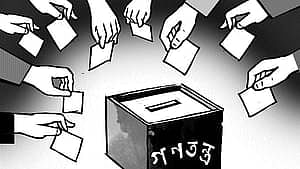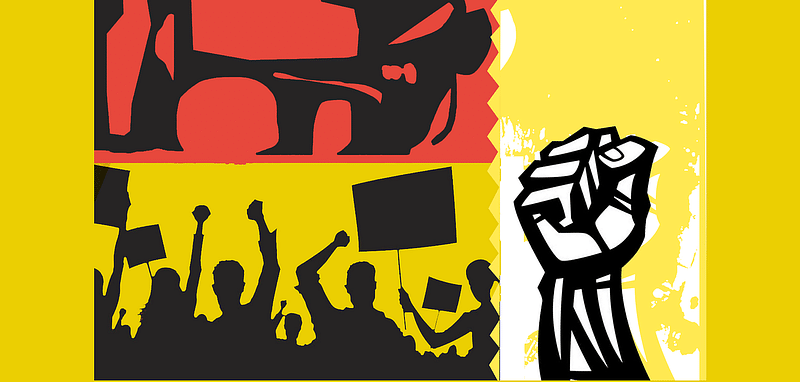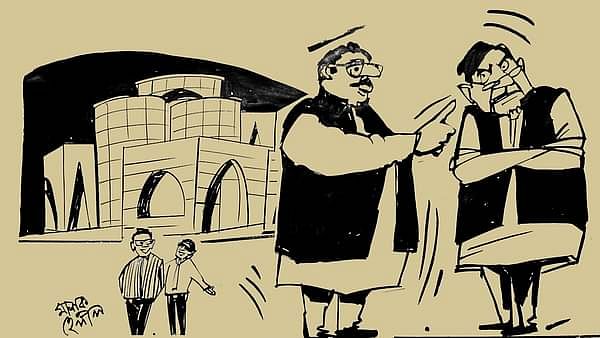
Autocratic governments are gaining ground in various countries of the world. In many countries the governments are doing away with democratic norms despite coming to power on public mandate. There is also a move to promote the idea that democracy has no hard and fast definition or principle. But is that actually so? Ali Riaz discusses the position and the pertinence of democracy in the long search for a universally acceptable and most just system of governance, dating back to the ancient times of the Greek city-state. This is the third and last installment of the three-part series on the topic.
While the existing rule of government in Bangladesh has a façade of democracy, questions can certainly be raised about how far it is democratic in the true sense of the word. The ruling party and its supporters claim that this is the reflection of the people’s aspirations. But what do the people of Bangladesh actually understand as democracy, what do they want? We must keep in mind that the four core principles of democracy are sovereignty of the people, representation, accountability and freedom of expression. And three essential attributes of democracy are voting rights; regular free, competitive, multiparty elections for the parliament and the post of chief executive; and ensuring civil and political rights. Do the people of Bangladesh expect anything less than this?
A way to understand what form of democracy the people of Bangladesh want, is to refer to surveys taken in the past. A survey was conducted on 4,067 families from 12 April to 30 April 2017 under a project of Resolve (principal researchers – Ali Riaz and Christine C Fair) where, among other issues, questions were asked concerning democracy. In this nationally representative face-to-face survey, we found overwhelming support for certain core principles of democracy.
Democracy has been continuously subject to serious deterioration over the past three decades and has now gone into regression. In order to retract from that path, it is imperative to understand the core principles of democracy and, based on that, the democratic forces can determine what is to be done
Of the other attributes of democracy, freedom of expression and freedom of organisation were supported by 76 per cent and 75 per cent of the respondents respectively. The respondents were strongly in favour of elected leadership. Of them, 55 per cent were in favour of democratic secular leadership and 39 per cent supported democratically elected religious leaders. Very few were in favour of non-democratic leadership, whether secular or religious. The results of the survey identified people’s views towards democracy and the indications of democratic rule. This survey was carried out over three years after the election held in 2014. The 2014 election was not free and participatory, but these attributes of democracy had not lost relevance to the people. They still measured democracy by these attributes.
Also Read
Democracy not a system dependent on the will of the rulers

The results of our survey were not surprising. They were consistent with surveys conducted previously. In a survey conducted by USAID in late 2003, nearly two-thirds of the respondents (62 per cent) had chosen a ‘government ruled by democratically elected representatives’ as their preferred system of governance. Among the other choices, 21 per cent were in favour of a ‘government rules by Islamic law, with respected religious figures as leaders.’ This was followed by 11 per cent respondents in favour of ‘a government ruled by a military leaders who gets things done’, and 3 per cent for ‘a non-elected government ruled by specialists, experts and business leaders who know what it takes to develop a country.’
These views were almost the same, a decade since then. A survey by the Pew Research Center in 2014 showed that 70 per cent of Bangladesh were in favour of democracy as opposed to 27 per cent who preferred a ‘strong leader’.
In a survey of the Governance Barometer Survey Bangladesh 2019 (conducted by BRAC University), 80 per cent of the respondents felt that elections were the significant ideal of democracy. This was followed by free public debate (71per cent), rule of consent (60 per cent), ability to participate in decision making (50 per cent) and ability to access information on government activities (40 per cent).
Also Read
Three attributes of democratic rule

About the attributes of democracy, the Global Survey conducted by the Pew Research Center in 2002 showed that Bangladeshis identified three major attributes of democracy: people can openly criticise the government (81 per cent), neutral, two-party elections (71 per cent); and the free press an report without censorship (64 per cent).
There is hardly any need to go into details of the gap between the expectations of the Bangladeshi people concerning democracy which have remained unchanged over two decades, and the prevailing state of governance in the country. It is clear for all to see. From the history of the past 50 years we see that the country’s democracy had been eroded by the leaders, both civilian and military. Democracy has been continuously subject to serious deterioration over the past three decades and has now gone into regression. In order to retract from that path, it is imperative to understand the core principles of democracy and, based on that, the democratic forces can determine what is to be done.
* Ali Riaz is a distinguished professor at the Illinois State University in the US.
* This column appeared in the print edition of Prothom Alo and has been rewritten for the English edition by Ayesha Kabir
